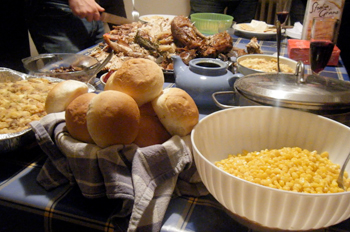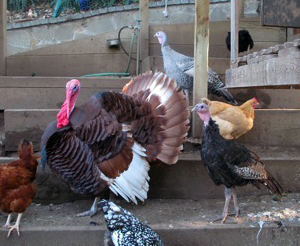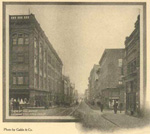 Forget about Thanksgiving dinner. I can’t wait until the day after Thanksgiving for leftovers. When else during the year can you look forward to turkey soup, turkey chopped liver, smoked turkey sandwiches, and above all turkey hash in a single day? All this month, on www.barbecuebible.com, we’ve been telling you how to cook turkey on the grill. Make sure you manage to squirrel away a pound or so of the cooked turkey meat for hash.
Forget about Thanksgiving dinner. I can’t wait until the day after Thanksgiving for leftovers. When else during the year can you look forward to turkey soup, turkey chopped liver, smoked turkey sandwiches, and above all turkey hash in a single day? All this month, on www.barbecuebible.com, we’ve been telling you how to cook turkey on the grill. Make sure you manage to squirrel away a pound or so of the cooked turkey meat for hash.
Our word hash comes from the French verb hacher, "to chop." (Yeah, it’s the same etymological root as that chopping device favored by George Washington, the hatchet.) Hash originated as a way to use up leftovers, but it now turns up not just at hash houses (a nickname for diners) but at high-falutin’ restaurants from coast to coast.
The most common version of hash contains corned beef and potatoes, but you can make hash with an almost endless variety of ingredients. Rural New Englanders combined corned beef, potatoes, and beets to make red flannel hash. In seafaring communities it was common to find salt cod and fish hash. Hachis parmentier, garlicky chopped lamb and potatoes, is classic comfort food in France.

 “It feels like we are in a movie,” said Alessandro across the living room as he stabbed his fork into a giant piece of turkey. “We see this in the movies, but we never experience it. This is my first
Thanksgiving.”
“It feels like we are in a movie,” said Alessandro across the living room as he stabbed his fork into a giant piece of turkey. “We see this in the movies, but we never experience it. This is my first
Thanksgiving.”
 There are ten of us for dinner this year, ranging in age from 2 ½ to 91. My granddaughter, who is clearly her mother’s daughter in terms of her young culinary interests, feasts solely on (in this order) pumpkin pie and cranberries. At least two other guests besides the two pescatarians opt for salmon. Five traditionalists dine on turkey and sweet potatoes. Everyone except the two-year-old has several helpings of green bean casserole, that holdover from the fifties that is about as healthy as—but even more delicious than—Twinkies. I have a large and lovely glass of the wine selected by my daughter-in-law and contemplate the table.
There are ten of us for dinner this year, ranging in age from 2 ½ to 91. My granddaughter, who is clearly her mother’s daughter in terms of her young culinary interests, feasts solely on (in this order) pumpkin pie and cranberries. At least two other guests besides the two pescatarians opt for salmon. Five traditionalists dine on turkey and sweet potatoes. Everyone except the two-year-old has several helpings of green bean casserole, that holdover from the fifties that is about as healthy as—but even more delicious than—Twinkies. I have a large and lovely glass of the wine selected by my daughter-in-law and contemplate the table. A couple of years ago I raised a pair of heirloom turkey chicks – a Bourbon Red and a Spanish Black. The Spanish Black Tom was roasted, the Red still struts and preens in my chicken yard. I’ve taken to calling
him MOLE.
A couple of years ago I raised a pair of heirloom turkey chicks – a Bourbon Red and a Spanish Black. The Spanish Black Tom was roasted, the Red still struts and preens in my chicken yard. I’ve taken to calling
him MOLE.
 My grandfather and several of my great uncles had a fur store in N.Y. It was called Windsor Furs (to indicate, one can only guess, a regal presence previously unknown to 14th Street and 7th Avenue). Uncle Simon and Uncle Harry kept Windsor Furs well into their 90’s. And I would like to tell you all the funny, memorable stories I know about them and the shop. But the thing that springs to mind at this moment is their business card.
My grandfather and several of my great uncles had a fur store in N.Y. It was called Windsor Furs (to indicate, one can only guess, a regal presence previously unknown to 14th Street and 7th Avenue). Uncle Simon and Uncle Harry kept Windsor Furs well into their 90’s. And I would like to tell you all the funny, memorable stories I know about them and the shop. But the thing that springs to mind at this moment is their business card. 